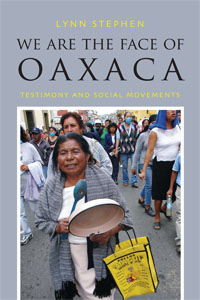 Presentación de Libro
Presentación de Libro
Book Launch
Knight Library Browsing Rm
We Are the Face of Oaxaca: Testimony and Social Movements
by Lynn Stephen, Director, CLLAS
Distinguished Professor, UO Department of Anthropology
Published by Duke University Press (September 2013)
Program
4:00 – 5:15 Comments from speakers, response from author
5:15- 6:00 food and socializing
Speakers
- Karen Estlund, Head, Digital Scholarship Center, University of Oregon Libraries
- Dr. Mauricio Magaña, Institute of American Cultures Postdoctoral Fellow in Chicano Studies at the University of California, Los Angeles.
- Dr. Phil Scher, Associate Professor, Department of Anthropology
- Dr. Gabriela Martinez, Associate Professor, School of Journalism and Communication
- Ramiro Aragon and Ruth Guzman, Oaxaca political asylees and human rights advocates
Sponsored by the Department of Anthropology, University of Oregon Libraries, Center for Latino/a and Latin American Studies (CLLAS), and the Latin American Studies program.
For the first time, Duke University Press has developed an ebook project that thoroughly engages the reader both within and beyond. Lynn Stephen’s well-thought out and well-executed web project presented us with an opportunity to explore ways of bringing a physical object—a printed book—into conversation with an online, digital object. With We Are the Face of Oaxaca, we’ve been able to move beyond ‘For more, visit this website’ and really exploit new standards, such as digital object identifiers (DOIs), to bring the reader of either the print book or the ebook directly and reliably to the relevant media available online. The companion website provides readers with direct access to the testimonies, ideas, and photographs found within the pages of the book to encourage deeper research and multilayered learning. The digital content is particularly relevant since We Are the Face of Oaxaca focuses on the use of oral testimony in contemporary social movements. Seeing the video testimonies firsthand allows readers to engage with primary materials from which Stephen based her analysis.”
Book website: http://faceofoaxaca.uoregon.edu/introduction
Information about the book and link to website: http://www.dukeupress.edu/We-Are-the-Face-of-Oaxaca/
Book Description
A massive uprising against the Mexican state of Oaxaca began with the emergence of the Popular Assembly of the Peoples of Oaxaca (APPO) in June 2006. A coalition of more than 300 organizations, the APPO disrupted the functions of Oaxaca’s government for six months. It began to develop an inclusive and participatory political vision for the state. Testimonials were broadcast on radio and television stations appropriated by the APPO, shared at public demonstrations, debated in homes and in the streets, and disseminated around the world via the Internet.
The movement was met with violent repression. Participants were imprisoned, tortured, and even killed. Lynn Stephen emphasizes the crucial role of testimony in human-rights work, indigenous cultural history, community and indigenous radio, and women’s articulation of their rights to speak and be heard. She also explores transborder support for the APPO, particularly among Oaxacan immigrants in Los Angeles. The book is supplemented by a website featuring video testimonials, pictures, documents, and a timeline of key events.
Editorial Reviews
“We Are the Face of Oaxaca is a magnificent book. A model of engaged scholarship and the best work yet by Lynn Stephen, it is an original analysis of the massive popular rebellion in Oaxaca, Mexico, during 2006–07. Given her deep, long-term ties to Oaxacans in both Mexico and the United States, Stephen is uniquely positioned to analyze the social movement and the significance of participants’ testimonials in its production and reception.”—Patricia Zavella, author of I’m Neither Here nor There: Mexicans’ Quotidian Struggles with Migration and Poverty
“Given the new visibility of protest, Lynn Stephen’s fascinating book offers a valuable opportunity to understand how protest movements work at the grass roots. This ethnography of the Oaxacan protest of 2006 focuses on testimony: the performed, embodied act of telling a story. Protesters’ courageous testimonies broadcast over the radio made a difference. The book and its website with recordings provide a wonderful opportunity to hear the testimonies of those with courage to speak.”—Sally Engle Merry, author of Human Rights and Gender Violence: Translating International Law into Local Justice
About the Author
Lynn Stephen is Distinguished Professor of Arts and Sciences, Professor of Anthropology, and Director of the Center for Latino/a and Latin American Studies at the University of Oregon. She is the author of Transborder Lives: Indigenous Oaxacans in Mexico, California, and Oregon and Zapotec Women: Gender, Class, and Ethnicity in Globalized Oaxaca, both also published by Duke University Press.
